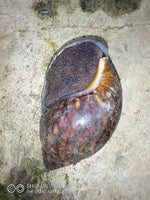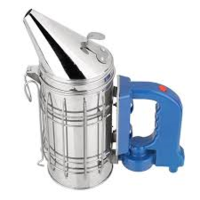Post by Ismail AbdulAzeez on Aug 1, 2010 12:58:08 GMT 1
Snail – Farming To Wealth an Article Written About Ismail AbdulAzeez by The News on 26th July,2010.Page 32 -34.
For three years after his youth service in 2005, Gbenga Ibikunle, a Business Administration graduate, was pounding offices all over Lagos searching for a job. Although Ibikunle had fortuitously undergone a short training in snail farming in Nigeria on the farm estate in Ondo State where he did his service year, the spell was just a formality to him. He was convinced farming wasn’t it; he was looking forward to securing a juicy white-collar job in Lagos.
Three years at home and with no job in sight, Ibikunle was compelled to start thinking of applying the snail farming training he had productively. “It wasn’t as if I was particularly enamoured of the idea,”, he told this magazine. “But, at least, that is the only area I can say I had a training that I can apply with ease and there was space to practice it. It would keep me busy and kill the boredroom that I was increasingly finding most frustrating, but it wasn’t as if I thought anything great of it.”
That was then. Today, Ibikunle has been thinking something of snail farming. Two years ago, he was able to source N25,000 which he ploughed into constructing a snail pen at his backyard. A year and a half after, the graduate small-scale farmer was surprised he could make about N200,000 from marketing the snails. The effort has been paying his bills with something extra to diversify into another small-scale business.
Ismail Abdulazeez quipped that Ibikunle is toeing the snail farming too unambitiously. He probably should know. Abudulazeez is managing consultant of Thy Snail and Grasscutter Consult, www.thethyconsulting.com/thebeautyofgrasscutterfarming.htm a training and advisory concern that teaches newcomers to the snail and grascutter farming in Nigeria on how to achieve easy streets through the venture. Abdulazeez enthused it is possible to start snail farming with a capital of N100,000 and earn a profit of N1mn within a year.
Mrs. Yemisi Olaleye a Lagos-based retired civil servant agreed. Olaleye claimed to have made a turnover of N100,000 last month alone from snail sales to a friend who runs an eatery.
Gradually, snail farming in is assuming wider significance in Nigeria as various factors, mainly unemployment and diminishing purchasing power prompt people to seek alternatives to beat the hard times. Snails, hermaphroditic animals, belong to the species of animals called ‘Mollusca’. Snails are categorized into three: sea snails, land snails and fresh water snails. They are easily found in a cool, damp or humid environment because such area favour their existence. Virtually the two main components of a snail – the inner edible part and the hard outer shell – are useful for several purposes. Reproduction take place during rainy season as one snail mates with another of the same species, producing normally hundreds of eggs which hatch between 10 – 28 days, irrespective of the type. They mature within five to eight months and could live as long as seven to 10 years.
Farming snails is lucrative, as many Nigerians are realizing. Apart from the fact that it is easy to manage, it does not require much technicalities or capital as snails can easily be found around for the take-off. “It is easy to start with little or no fund. It depends on your purpose, whether it is for personal consumption or commercial reason, and how you want to rear them. The pen ranges from the use of pots, drums and plastic enclosures to ponds. The most important things are know the soil requirements, the appropriate specie needed and protection of the snails from threats, predators, harsh weather and unnecessary human interference, “Abdulazeez informed.
Rearing snails on a small scale simply entails putting them in a pot, a drum, or any vessel deemed fit, fill with humus soil about 3-5inches deep. Dry, sandy or heavy soil like clay is not suitable for snail farming. Such soils’ components make them inactive and do not have the necessary organic components needed for optimal growth.
Rearing them on a larger scale or for a business motive requires, of course, more resources. A choice can be made from the pond system, the poultry type and the free range system. These methods might necessitate getting a small piece of land to construct a poultry –like enclosure for the poultry system, the open pond or pen for the free range system. The last option allows the snails to dwell in what is a replica of their natural habitat. This is achieved by constructing pens, rectangular-shaped enclosures made of wood, cement, 6-inch blocks and galvanized sheet steel to house the snails. The floor of the pens must be filled with humus and the top covered with net to wars off birds or predators.
It is important to maintain good hygiene. A pen should be not be overcrowded with snails to prevent diseases.
Research has shown that the West African giant snail Archanchatina Marginata is the most appropriate for farming in Nigeria because it suits the climatic conditions in the country. It will take about a year for it to grow properly for harvesting. From snout to tail it can grow properly for harvesting. From snout to tail it can grow up to 15 inches or 39.3cm and has a high monetary value in Nigeria due to its high demand. Feeding snails is less expensive. It is usually done once in a day. They are always more active at night due to the fact that this is when they feed. Though there are some specially packed feeds or mash for snails. They can still feed on juicy vegetables and fruits which include pawpaw, mango, pineapple, sweet potatoes, leaves, peels from yam, lettuce, tomatoes, cocoyam, beans, water leaf and citrus. The fact that the feeds can be sourced locally and everywhere adds to making snail farming in Nigeria a less expensive business.
Snail farmers are making a kill as global demand for the delicacy increases. In Nigeria, the price of raw snail ranges from N250 to N600 depending on the size. The fast food culture has been enhancing demand for the prepared meat. Some farmers are on the supply bill of eateries and are, therefore, assured of a ready market for their harvest. Market abroad are also yearning for snails from west African. France requires about five million kilogram of the stuff annually, a larger percentage of it coming from snail farming countries like Nigeria. The United States of America also imports close to $4mn worth of snails annuall from all over the world, including Nigeria. In West African, mostly in Nigeria, the annual requirement is estimated to be 7.9mn kg. in Ghana, it is about 15,000 tonnes.
The universal practice in the snail export business is to prepare and pack the meat before shipping. Mature snails are dipped in hot water and boiled for 20 to 30minutes. Thereafter the edible part is disengaged from the shell washed severally with vinegar, lime and salt water and packed in a polythene bag weighing 4 to 8kg, or canned. The consignment is frozen to keep it fresh for export. Snail demand continues to be higher than supply on the market, providing a fillip for both existing and new investors.
Raising snails demands sacrifice of time in monitoring and protecting them from human interfence, theft, ants, ear wigs, toads, frogs, nematodes, fungi, millipedes, vibration, lizards, unnecessary noise, harsh lighting torch and wetting their pens, especially during the dry season. The profitability of the business, however, levels out the challenges. “Virtually every part of a snail is useful for several purposes – economic medicinal or pharmaceutical. The financial benefits in farming it far outweigh the challenges,” Olaleye said, “As a part-time vocation, it can be successfully run alongside one’s usual job or other businesses.” She said. If a grower starts a snail farm with 50 snails, it can produce averagely up to 250,000 adult snails worth over N5mn in a year. Snail reproduce rapidly, depending on the type. The archachatina Marginata and the Achatina Achatina which are the commonest species in West Africa could lay about 200-400 eggs two or three times a year.
For three years after his youth service in 2005, Gbenga Ibikunle, a Business Administration graduate, was pounding offices all over Lagos searching for a job. Although Ibikunle had fortuitously undergone a short training in snail farming in Nigeria on the farm estate in Ondo State where he did his service year, the spell was just a formality to him. He was convinced farming wasn’t it; he was looking forward to securing a juicy white-collar job in Lagos.
Three years at home and with no job in sight, Ibikunle was compelled to start thinking of applying the snail farming training he had productively. “It wasn’t as if I was particularly enamoured of the idea,”, he told this magazine. “But, at least, that is the only area I can say I had a training that I can apply with ease and there was space to practice it. It would keep me busy and kill the boredroom that I was increasingly finding most frustrating, but it wasn’t as if I thought anything great of it.”
That was then. Today, Ibikunle has been thinking something of snail farming. Two years ago, he was able to source N25,000 which he ploughed into constructing a snail pen at his backyard. A year and a half after, the graduate small-scale farmer was surprised he could make about N200,000 from marketing the snails. The effort has been paying his bills with something extra to diversify into another small-scale business.
Ismail Abdulazeez quipped that Ibikunle is toeing the snail farming too unambitiously. He probably should know. Abudulazeez is managing consultant of Thy Snail and Grasscutter Consult, www.thethyconsulting.com/thebeautyofgrasscutterfarming.htm a training and advisory concern that teaches newcomers to the snail and grascutter farming in Nigeria on how to achieve easy streets through the venture. Abdulazeez enthused it is possible to start snail farming with a capital of N100,000 and earn a profit of N1mn within a year.
Mrs. Yemisi Olaleye a Lagos-based retired civil servant agreed. Olaleye claimed to have made a turnover of N100,000 last month alone from snail sales to a friend who runs an eatery.
Gradually, snail farming in is assuming wider significance in Nigeria as various factors, mainly unemployment and diminishing purchasing power prompt people to seek alternatives to beat the hard times. Snails, hermaphroditic animals, belong to the species of animals called ‘Mollusca’. Snails are categorized into three: sea snails, land snails and fresh water snails. They are easily found in a cool, damp or humid environment because such area favour their existence. Virtually the two main components of a snail – the inner edible part and the hard outer shell – are useful for several purposes. Reproduction take place during rainy season as one snail mates with another of the same species, producing normally hundreds of eggs which hatch between 10 – 28 days, irrespective of the type. They mature within five to eight months and could live as long as seven to 10 years.
Farming snails is lucrative, as many Nigerians are realizing. Apart from the fact that it is easy to manage, it does not require much technicalities or capital as snails can easily be found around for the take-off. “It is easy to start with little or no fund. It depends on your purpose, whether it is for personal consumption or commercial reason, and how you want to rear them. The pen ranges from the use of pots, drums and plastic enclosures to ponds. The most important things are know the soil requirements, the appropriate specie needed and protection of the snails from threats, predators, harsh weather and unnecessary human interference, “Abdulazeez informed.
Rearing snails on a small scale simply entails putting them in a pot, a drum, or any vessel deemed fit, fill with humus soil about 3-5inches deep. Dry, sandy or heavy soil like clay is not suitable for snail farming. Such soils’ components make them inactive and do not have the necessary organic components needed for optimal growth.
Rearing them on a larger scale or for a business motive requires, of course, more resources. A choice can be made from the pond system, the poultry type and the free range system. These methods might necessitate getting a small piece of land to construct a poultry –like enclosure for the poultry system, the open pond or pen for the free range system. The last option allows the snails to dwell in what is a replica of their natural habitat. This is achieved by constructing pens, rectangular-shaped enclosures made of wood, cement, 6-inch blocks and galvanized sheet steel to house the snails. The floor of the pens must be filled with humus and the top covered with net to wars off birds or predators.
It is important to maintain good hygiene. A pen should be not be overcrowded with snails to prevent diseases.
Research has shown that the West African giant snail Archanchatina Marginata is the most appropriate for farming in Nigeria because it suits the climatic conditions in the country. It will take about a year for it to grow properly for harvesting. From snout to tail it can grow properly for harvesting. From snout to tail it can grow up to 15 inches or 39.3cm and has a high monetary value in Nigeria due to its high demand. Feeding snails is less expensive. It is usually done once in a day. They are always more active at night due to the fact that this is when they feed. Though there are some specially packed feeds or mash for snails. They can still feed on juicy vegetables and fruits which include pawpaw, mango, pineapple, sweet potatoes, leaves, peels from yam, lettuce, tomatoes, cocoyam, beans, water leaf and citrus. The fact that the feeds can be sourced locally and everywhere adds to making snail farming in Nigeria a less expensive business.
Snail farmers are making a kill as global demand for the delicacy increases. In Nigeria, the price of raw snail ranges from N250 to N600 depending on the size. The fast food culture has been enhancing demand for the prepared meat. Some farmers are on the supply bill of eateries and are, therefore, assured of a ready market for their harvest. Market abroad are also yearning for snails from west African. France requires about five million kilogram of the stuff annually, a larger percentage of it coming from snail farming countries like Nigeria. The United States of America also imports close to $4mn worth of snails annuall from all over the world, including Nigeria. In West African, mostly in Nigeria, the annual requirement is estimated to be 7.9mn kg. in Ghana, it is about 15,000 tonnes.
The universal practice in the snail export business is to prepare and pack the meat before shipping. Mature snails are dipped in hot water and boiled for 20 to 30minutes. Thereafter the edible part is disengaged from the shell washed severally with vinegar, lime and salt water and packed in a polythene bag weighing 4 to 8kg, or canned. The consignment is frozen to keep it fresh for export. Snail demand continues to be higher than supply on the market, providing a fillip for both existing and new investors.
Raising snails demands sacrifice of time in monitoring and protecting them from human interfence, theft, ants, ear wigs, toads, frogs, nematodes, fungi, millipedes, vibration, lizards, unnecessary noise, harsh lighting torch and wetting their pens, especially during the dry season. The profitability of the business, however, levels out the challenges. “Virtually every part of a snail is useful for several purposes – economic medicinal or pharmaceutical. The financial benefits in farming it far outweigh the challenges,” Olaleye said, “As a part-time vocation, it can be successfully run alongside one’s usual job or other businesses.” She said. If a grower starts a snail farm with 50 snails, it can produce averagely up to 250,000 adult snails worth over N5mn in a year. Snail reproduce rapidly, depending on the type. The archachatina Marginata and the Achatina Achatina which are the commonest species in West Africa could lay about 200-400 eggs two or three times a year.














